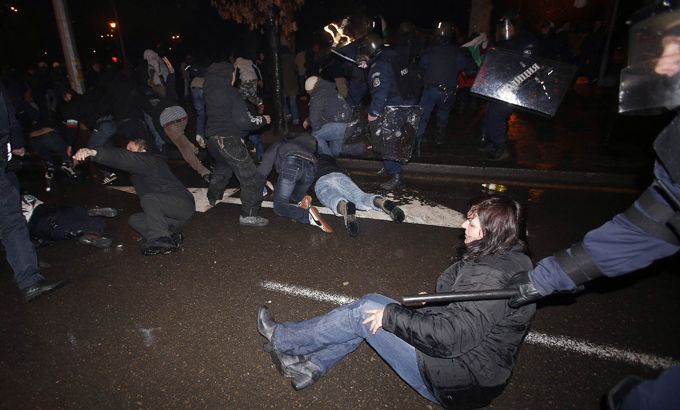Bulgaria rallies continue as government quits
Protesters march towards parliament shortly after prime minister announced surprise resignation of his government.

Protests have continued in the Bulgarian capital of Sofia after Prime Minister Boiko Borisov announced the resignation of his government.
Around 2,000 people marched towards parliament on Wednesday, separated by policemen from a group of Borisov supporters who called for his return to power.
The government resignation came after 10 days of nationwide protests against high power prices and falling living standards.
“It is the people who put us in power and we give it back to them today,” Borisov told parliament as he announced the surprise resignation.
Alexander Marinov, a protester, said the people’s discontent had reached its peak.
“This can not continue,” he said. “We removed Borisov, who was the smallest trouble, but the others are still in power, that is why we will continue to fight.”
The mass demonstrations were sparked by soaring electricity prices but quickly changes focus onto wider frustration with high unemployment, low salaries, corruption and power monopolies.
The country is the poorest in the European Union, and unions say the unemployment rate is up to 18 percent.
Tens of thousands of people staged daily rallies across the country, shouting “Mafia!”, “Garbage!” and “Resign!”
Violent clashes between protesters and police on Monday and Tuesday left 28 people injured.
“I will not participate in a government where the police beat people up or where threats for protests replace political dialogue,” Borisov told parliament.
Low salaries
He had tried to calm protests by sacking his finance minister, pledging to cut power prices and punish foreign-owned companies, but the measures failed to defuse discontent.
Stoyen Georgiev, a local reporter, told Al Jazeera from Sofia that the protests were less about the electricity rate, which is among the lowest on the continent, and more about salaries.
“Bulgaria is getting the lowest wages in the whole European Union,” he said.
Average salaries are stuck at around 800 levs ($550) a month.
Millions have emigrated in search of a better life, leaving swathes of the country depopulated and little hope for those who remain.
“He made my day,” student Borislav Hadzhiev, 21, in central Sofia said, commenting on Borisov’s resignation. “The truth is that we’re living in an extremely poor country.”
Parliament, where Borisov’s GERB party holds a near majority, was expected to accept the resignation when it meets at on Thursday.
With both Borisov and his opposition Socialists refusing to form a new cabinet under the current parliament, a caretaker government of experts will have to be appointed by the president to organise early elections.
The vote will most likely take place in April or May.
GERB has remained popular, largely because budget cutbacks have been relatively mild compared with those in many other European countries. Salaries and pensions were frozen rather than cut.
But the last opinion poll, taken before protests grew last weekend already showed the opposition Socialists were nearly tied with the ruling party and analysts said the protests had boosted the Socialists’ chances.